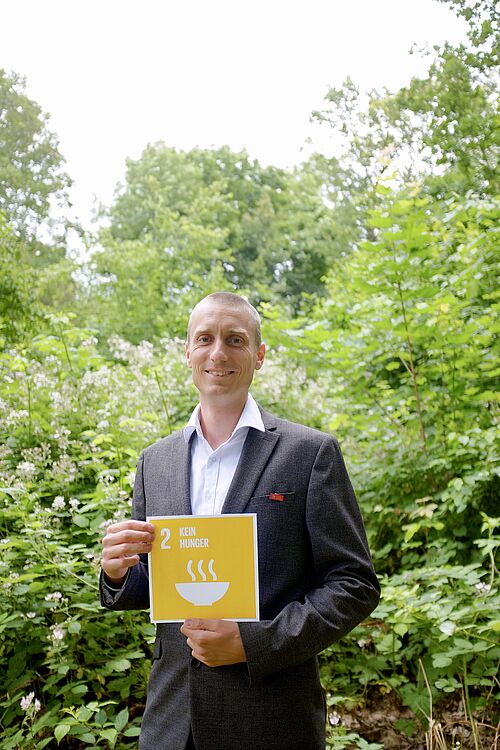
Today we would like to introduce you to Prof. Dr. Boas Pucker, who works at the Institute of Plant Biology in the field of plant biotechnology and bioinformatics.
He is committed to the “Zero Hunger” goal and answered a few questions for us.
How does your work relate to this SDG?
Our research on various crops is geared towards SDG2 (Zero Hunger). We analyze the genomes of different crops in collaborative projects with the aim of identifying relevant genetic regions that are responsible for a specific trait, such as resistance to pests or tolerance to unfavorable conditions. Our research thus forms the basis for the improvement of crops through the targeted use of this information for the breeding of high-yielding, tolerant and resilient varieties.
Our work includes sugar beet, one of the most important sugar sources and crops in the northern hemisphere. We are also working in cooperation with the AG Winter (DSMZ) on cassava, which is a staple food in Africa. While these projects are aimed at securing yields, we are also involved in projects to optimize the health benefits of bananas.
How did you become interested in this topic and where did your interest come from?
I have been interested in sugar beet since my bachelor thesis on flavonoid biosynthesis in sugar beet. In general, I see the application of knowledge from plant biology to crops as an important goal. Special research topics often result from the exchange with breeding companies. For the cooperation with AG Winter, getting to know each other via social media and the close proximity in Braunschweig were decisive factors. My motivation for working with crops can be explained by Norman Borlaug's insight that ensuring food security is an essential basis for the sustainable avoidance of conflicts.
Is there a connection between your topic and other SDGs?
We are clarifying biosynthetic pathways of medically useful components in plants to facilitate the production of medicines. We are also investigating how the content of health-promoting substances in plants can be increased. In this way, we contribute to “Good Health and Well-Being”. In this context, my group is also involved in BRICS and the research focus “Engineering for Health”.
The protection of biodiversity (“life on land”) is achieved by increasing the yield of plants so that less arable land is required to feed a growing world population. Genome editing is an extremely important tool for quickly applying the findings from our research.
All materials from my teaching are made freely available via GitHub under an open license. This is my contribution to quality education.
Which 3 words do you associate with this SDG?
Genome editing in crop-plants
What support would you like so that you can incorporate your SDG even more effectively into teaching and research in the future?
My teaching and research are essentially hampered by an enormous administrative burden. Therefore, the reduction of bureaucratic obstacles alone would be enough to increase my activities for SDG#2.
Vacancies of TU Braunschweig
Career Service' Job Exchange
Merchandising
Term Dates
Courses
Degree Programmes
Information for Freshman
TUCard
Technische Universität Braunschweig
Universitätsplatz 2
38106 Braunschweig
P. O. Box: 38092 Braunschweig
GERMANY
Phone: +49 (0) 531 391-0
